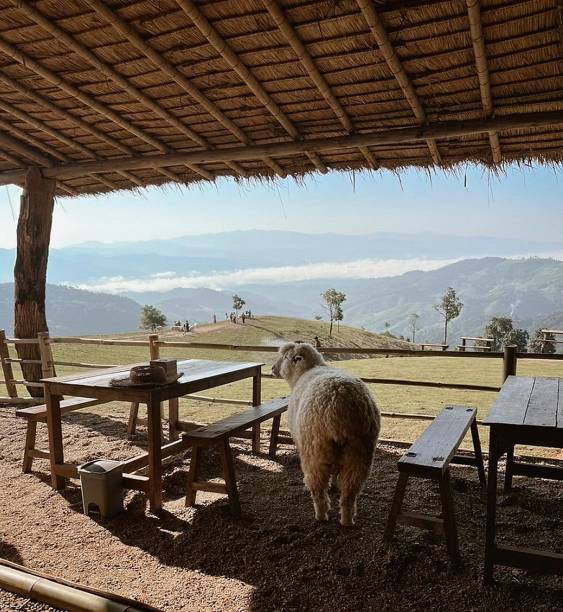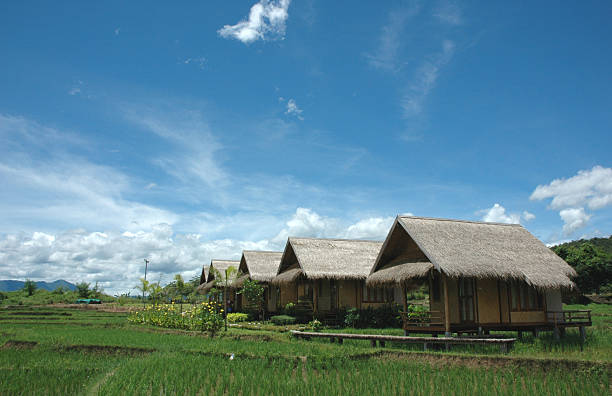In the hustle and bustle of modern life, the allure of open fields, fresh air, and a slower pace of living has never been more enticing. This longing for a deeper connection with nature and a desire for authentic, immersive experiences has given rise to a burgeoning trend in travel – agritourism.
Agritourism, at its heart, is a celebration of the agricultural way of life. It’s a journey that takes you beyond the well-trodden tourist paths and immerses you in the heart of a working farm. Here, the rhythms of nature dictate the day, and the bounty of the land becomes your daily bread. It’s a redefinition of travel, where you don’t just visit a place, but become a part of it.
In this exploration, we will delve into the roots of agritourism, uncover its multifaceted benefits, and guide you in choosing the perfect farm stay for your next adventure. From hands-on experiences in the fields to savouring the fruits of the land, this journey promises a tapestry of memories and a deeper understanding of the symbiotic relationship between humans and the earth.
So, pack your bags and leave behind the familiar comforts of urban life, for a new chapter of travel awaits. Join us as we embark on a journey through the world of farm stays and agritourism, where the fields are our canvas and the harvest our reward.
Section 1: The Rise of Agritourism
Historical Background of Agritourism
Agritourism, though now a buzzword in the travel industry, has deep historical roots. It harks back to a time when agrarian societies celebrated the harvest with festivals and communal gatherings. These traditions celebrated the symbiotic relationship between humans and the land, emphasising the importance of agriculture in our lives.
In recent decades, there’s been a resurgence of interest in agrarian lifestyles. Urbanisation and industrialization have disconnected many from the source of their sustenance, creating a yearning for a return to these foundational roots. As a result, agritourism has emerged as a means to bridge this gap, offering a direct link between consumers and the agricultural practices that sustain them.
Factors Contributing to the Popularity of Agritourism
1.Disconnect from Nature in Urban Environments:
In today’s fast-paced urban environments, it’s easy to lose touch with the natural world. Agritourism provides a sanctuary, where individuals and families can reacquaint themselves with the rhythms of the earth.
2.Desire for Authentic and Unique Experiences:
Traditional sightseeing tours and crowded attractions have started to lose their lustre. Travellers now seek more personal, authentic experiences that allow them to engage with local cultures and lifestyles on a deeper level. Agritourism offers just that, providing an intimate look into the daily lives of farmers and the ecosystems they nurture.
3.Support for Local and Sustainable Agriculture:
As awareness of the environmental impact of our choices grows, so does the desire to support local and sustainable practices. Agritourism not only provides a source of income for local farmers, but it also promotes sustainable agriculture methods, which are crucial for the long-term health of our planet.
The confluence of these factors has contributed to the meteoric rise of agritourism as a travel trend. It’s no longer just a vacation; it’s an opportunity to reconnect with our roots, gain a deeper understanding of our food sources, and support the communities that cultivate them.
Section 2: Benefits of Farm Stays and Agritourism
A) Immersive Cultural Experiences
Farm stays and agritourism offer travellers a unique chance to step into the shoes of local farmers and experience their way of life. It’s an immersion into a world where the daily routine revolves around the land, the seasons, and the animals. Visitors not only witness these rhythms but actively participate in them, gaining a profound appreciation for the hard work and dedication that goes into putting food on our tables.
B) Educational Opportunities for Visitors
The farm is a living classroom, where every corner holds a lesson in agriculture, ecology, and sustainability. Visitors of all ages have the chance to learn about crop cycles, animal husbandry, and the intricate web of relationships that sustain a farm ecosystem. From hands-on activities like picking fruits or milking cows to informative workshops on organic farming techniques, the learning opportunities are boundless.
C) Contribution to Local Economies and Communities
Agritourism isn’t just a boon for travellers; it’s a lifeline for rural communities. By opening their farms to visitors, local farmers diversify their income streams, helping to stabilise their livelihoods. Additionally, the influx of visitors injects capital into the local economy, supporting small businesses, artisans, and markets. It’s a symbiotic relationship that strengthens the fabric of these often-overlooked communities.
D) Environmental Sustainability and Conservation Efforts
Many farms practising agritourism are champions of sustainable agriculture. They implement practices like organic farming, crop rotation, and integrated pest management, reducing the environmental footprint of their operations. Furthermore, these farms often serve as stewards of natural habitats and wildlife, preserving biodiversity in the face of modern agricultural pressures.
In choosing a farm stay, travellers aren’t just selecting a picturesque getaway; they’re supporting a sustainable, community-driven approach to agriculture. The benefits ripple far beyond the fields, leaving a positive impact on the environment, the local economy, and the cultural heritage of the region.
Section 3: Types of Agritourism Experiences
A) Bed and Breakfast on Farms
For those seeking a cosy retreat amidst the pastoral beauty of a working farm, bed and breakfast accommodations are the epitome of rustic charm. Guests wake up to the sounds of roosters and the aroma of fresh-baked bread, enjoying a comfortable stay while immersing themselves in the daily life of the farm. This type of agritourism experience offers a perfect blend of relaxation and hands-on engagement.
B) Work-Based Experiences (e.g., WWOOFing)
For the adventurous traveller with a penchant for getting their hands dirty, work-based agritourism experiences are a perfect fit. Programs like WWOOF (World Wide Opportunities on Organic Farms) connect volunteers with farms around the world. In exchange for their labour, participants receive room, board, and invaluable hands-on experience in organic farming practices. It’s a chance to learn, contribute, and form lasting connections with fellow agrarians.
C) Farm-to-Table Dining Experiences
Gourmands and food enthusiasts will find farm-to-table agritourism experiences a true feast for the senses. These events often include tours of the farm, where visitors witness the cultivation of the very ingredients they’ll later savour in a carefully curated meal. It’s an opportunity to forge a direct connection between the plate and the land, gaining a profound appreciation for the journey that food takes from soil to table.
D) Agricultural Workshops and Classes
Agritourism isn’t just about observation; it’s about active participation. Many farms offer workshops and classes on a wide array of topics, from cheese-making to beekeeping, providing visitors with a hands-on education in various facets of agriculture. These sessions empower individuals to take a piece of the farm experience home with them, applying newfound skills in their own lives.
E) Farmers’ Markets and On-Farm Retail
For those who relish in the hunt for fresh, local produce and handmade goods, farmers’ markets and on-farm retail experiences are a treasure trove. Visitors can browse a bounty of seasonal fruits, vegetables, and artisanal products, often meeting the very farmers who nurtured the harvest. It’s a chance to support local agriculture directly and savour the flavours of the region.
Each type of agritourism experience offers a unique lens through which to view the world of farming. Whether you’re seeking relaxation, hands-on learning, or simply a taste of the local bounty, there’s an agritourism adventure suited to every palate.
Section 4: Choosing the Right Farm Stay

Factors to Consider when Planning a Farm Stay
Choosing the perfect farm stay requires thoughtful consideration of various factors to ensure a tailored experience that aligns with your preferences and needs.
1.Location and Accessibility:
Consider the proximity of the farm to amenities, attractions, and transportation hubs. Decide if you prefer a secluded retreat or a farm nestled within a bustling community.
2.Type of Farm and Activities Offered:
Different farms specialise in various types of agriculture. Some may focus on organic produce, while others may raise livestock or specialise in artisanal products like cheese or wine. Research the offerings of the farm to align them with your interests.
3.Accommodation Options and Amenities:
Farms offer a range of accommodations, from cosy cottages to rustic cabins. Evaluate the amenities available, such as private bathrooms, kitchen facilities, and communal spaces, to ensure they meet your comfort requirements.
4.Budget Considerations:
Establish a budget that includes accommodation costs, as well as any additional fees for activities or meals. Some farms offer package deals that bundle accommodations with experiences, providing a cost-effective option for a comprehensive farm stay.
5.Reviews and Recommendations:
Seek out reviews and testimonials from previous visitors to gain insights into the quality of the farm stay experience. Platforms like travel forums and review websites can offer valuable perspectives.
Personalized Farm Stay Experiences
Once you’ve identified farms that align with your preferences, consider tailoring your experience to match your interests. For example, if you’re passionate about sustainable agriculture, look for farms that implement eco-friendly practices. If you’re travelling with children, prioritise farms with family-friendly activities and accommodations.
Remember, the goal is to create a farm stay experience that resonates with your unique interests and aspirations. By carefully considering these factors, you’ll ensure that your farm stay becomes a cherished and enriching adventure.
Section 5: Preparing for Your Agritourism Adventure
Embarking on a farm stay adventure requires some thoughtful preparation to ensure a comfortable and enjoyable experience. Here are some essential tips to consider:
A) Packing Essentials for a Farm Stay
1.Comfortable Clothing:
Opt for layers, as weather conditions on a farm can be unpredictable. Include sturdy footwear suitable for walking on uneven terrain.
2.Sun Protection:
Pack sunscreen, hats, and sunglasses to shield yourself from the sun’s rays during outdoor activities.
3.Insect Repellent:
Farms are often nestled in natural surroundings, so it’s wise to have insect repellent on hand.
4.Reusable Water Bottle:
Staying hydrated is crucial, especially during outdoor activities. A reusable water bottle is an eco-friendly choice.
5.Personal Toiletries:
Bring along toiletries such as shampoo, conditioner, soap, and any specific items you prefer.
6.Farm-Friendly Gear:
Depending on the activities offered, you might need additional gear like gardening gloves, rain boots, or a sun hat.
B) Tips for a Comfortable Stay
1.Respect Farm Rules:
Farms may have specific rules and guidelines to ensure the safety and well-being of visitors and the farm’s inhabitants. Familiarise yourself with these guidelines and follow them diligently.
2.Engage with Farmers:
Take the opportunity to interact with the farmers and staff. They’re a wealth of knowledge about the farm’s operations and can offer valuable insights.
3.Embrace the Rustic Experience:
Keep in mind that farm stays often embrace a more rustic lifestyle. Be open to the simple pleasures of rural living, from outdoor showers to evenings spent stargazing.
4.Disconnect to Reconnect:
While some farms may offer Wi-Fi, consider taking this opportunity to disconnect from screens and immerse yourself fully in the natural surroundings.
5.Gratitude and Appreciation:
Show your appreciation to the farmers and staff for their hospitality. Small gestures like a thank-you note or offering to help with chores can go a long way.
C) Etiquette and Respect for the Farm
1.Leave No Trace:
Practice responsible tourism by leaving the farm and its surroundings exactly as you found them. Dispose of waste properly and respect wildlife habitats.
2.Respect Animal Welfare:
If the farm has animals, approach them gently and follow any guidelines provided for interaction. Always prioritise their well-being.
3.Ask Questions and Learn:
Don’t hesitate to ask questions about the farm’s operations. Farmers are often passionate about their work and are happy to share their knowledge.
By preparing thoughtfully and embracing the rustic charm of a farm stay, you’ll set the stage for a memorable and enriching adventure.
Section 7: Challenges and Considerations
As captivating as agritourism can be, it’s important to acknowledge that it comes with its own set of challenges and considerations. Being aware of these factors can help you plan for a smoother and more enjoyable farm stay experience.
A) Addressing Potential Concerns or Drawbacks
1.Weather Dependence:
Farms operate in sync with nature, which means activities may be affected by weather conditions. It’s essential to be flexible and prepared for changes in plans due to factors like rain or extreme temperatures.
2.Basic Amenities:
Farm stays often embrace a simpler, more rustic lifestyle. This means you may not have access to certain modern amenities, such as high-speed internet or luxurious spa facilities. Embrace this as part of the authentic experience.
3.Limited Accessibility:
Some farms may be located in rural or remote areas, which could pose challenges in terms of transportation or access to nearby services. Planning ahead and being aware of the farm’s location can help mitigate potential issues.
B) Tips for Overcoming Common Challenges
1.Pack Accordingly:
Anticipate the potential challenges of a rural environment and pack essentials like weather-appropriate clothing, sturdy footwear, and any specific items you may need.
2.Communicate with the Farm:
Prior to your arrival, reach out to the farm to clarify any concerns or questions you may have. They can provide valuable information about what to expect during your stay.
3.Embrace the Experience:
Rather than viewing challenges as obstacles, see them as opportunities for growth and learning. Embracing the rustic aspects of a farm stay can lead to a more fulfilling and enriching adventure.
4.Have a Backup Plan:
Consider having alternative activities or plans in case certain aspects of your farm stay are affected by unforeseen circumstances.
Remember, part of the charm of agritourism lies in its authenticity and the opportunity to reconnect with nature. By approaching any challenges with an open mind and a spirit of adventure, you’ll likely find that they add depth and character to your overall experience.
Conclusion
In the embrace of a farm’s rolling fields, beneath the expansive sky, travel takes on a new dimension. Agritourism transcends the boundaries of conventional vacations, offering a journey that awakens the senses and nurtures a deeper connection with the earth.
Through the rise of agritourism, we rediscover the timeless wisdom of agrarian societies, where the land is not just a resource, but a partner in our sustenance. It’s a chance to step off the well-worn path and immerse ourselves in the rhythms of nature, to witness the toil and dedication that fills our plates with abundance.
The benefits of farm stays and agritourism are as diverse as the landscapes they inhabit. It’s a cultural exchange, an educational odyssey, a boon to local economies, and a testament to the power of sustainable practices. Every visit to a farm is an investment in a way of life that cherishes the land and all its inhabitants.
As you embark on your own agritourism adventure, remember to pack not only your essentials, but also your curiosity and open-heartedness. Let the rustic charm and the simple pleasures of farm life be your guide. Engage with the farmers, savour the flavours, and breathe in the untamed beauty that surrounds you.
In the fields and barns, under the watchful eyes of farm animals, amidst the scents of earth and harvest, you’ll find a redefined travel experience. It’s a journey that leaves a mark not only on your memory but on your soul, a reminder of our deep-rooted connection to the land and the profound beauty it holds.
So, whether you’re seeking solace in the simplicity of rural life or a chance to learn from the custodians of the land, consider agritourism for your next voyage. It’s an invitation to travel not only outward, but inward, to discover the profound impact that a farm stay can have on your perspective and your heart.












